DILLON ON FILM
Great Films Without a Single Oscar Nomination
Think Barbie was overlooked? The Academy has a long history of swiping left on future classics
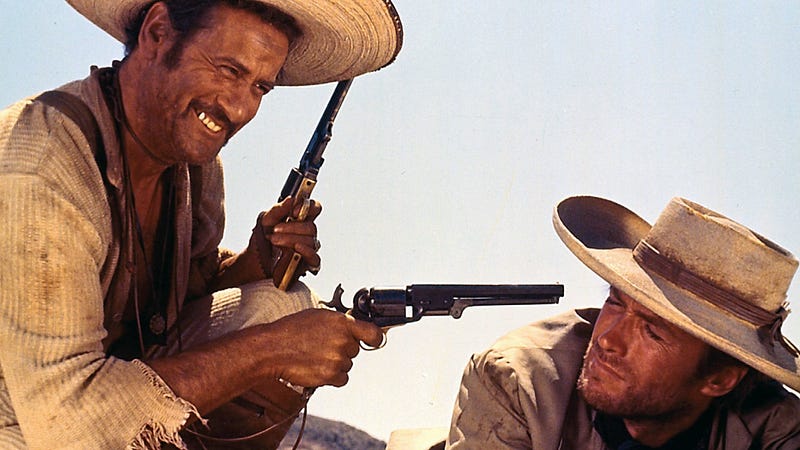
Whilst a significant segment of the Western world chokes on the sour grapes of Greta Gerwig and Margot Robbie being overlooked at this year’s Oscars (my thoughts on the matter here), it’s worth remembering Barbie still secured eight other nominations, including Best Picture. Some great films of yesteryear didn’t manage a single nomination. Here’s a far from exhaustive sample of the Academy’s most egregious oversights, many of which irk me to this day.
In preface, I should state I’m sticking to my strict ten-year rule in terms of what constitutes a classic film. Otherwise, I’d be tempted to include The Handmaiden (2016) and Uncut Gems (2019), not to mention this year’s unfairly cast asunder no-nomination offerings, including Are You There God? It’s Me, Margaret, All of Us Strangers, and The Iron Claw. More about my ten-year rule here, if you’re interested. And you should be, dammit. After all, what’s life without a futile attempt at quantifying the process of subjective judgement?
Two Hitchcockian Cock-Ups
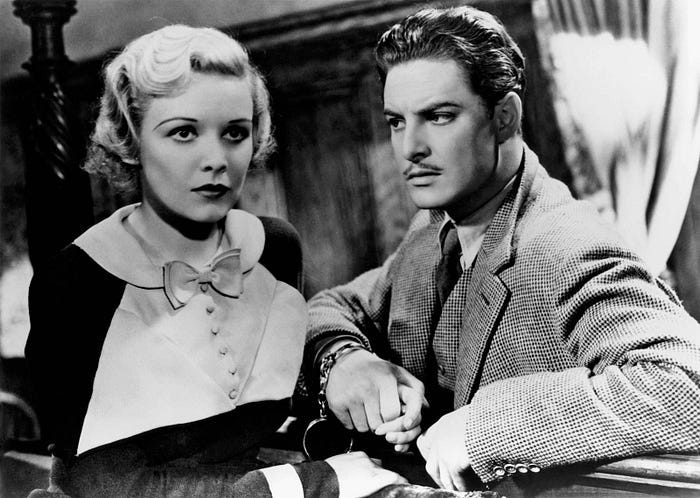
On with the show. Let’s start with one of cinema’s greatest directors: Alfred Hitchcock. Like Stanley Kubrick, he never won an Oscar (not counting lifetime achievement Oscars; essentially participation trophies). Yes, we’ll get to Kubrick in a moment. There’s plenty to moan about here.
To the point at hand, the Academy entirely ignored two of Hitchcock’s best films: The 39 Steps (1935) and The Lady Vanishes (1938). The former is an adaptation of John Buchan’s splendid spy novel that bears scant resemblance to the original text. But it doesn’t matter, because Hitchcock added a screwball love story subplot sizzling with kinky chemistry (and handcuffs), generally making the story his own to tremendous effect. Robert Donat and Madeleine Carroll are both wonderful in the leads.
As for the latter, it’s a terrific mystery, in which Margaret Lockwood plays a young woman gaslit by everyone on a train that she imagined the kindly old woman she had tea with, following a knock on the head. Michael Redgrave’s “musicologist” is the only passenger who believes her, but unfortunately, they had a tiff in the hotel the previous evening. Not the greatest of introductions. Still, he helps her get to the bottom of it, romantic sparks are kindled, espionage-related twists ensue, and there’s even an anti-appeasement message of sorts (timely, for 1938). As far as I’m concerned, both films deserved Best Picture, Best Director, and Best Screenplay nods. I’d also throw in a Best Editing nomination for The 39 Steps (take a bow, Derek N Twist).
Other Thrillers Overlooked by Oscar
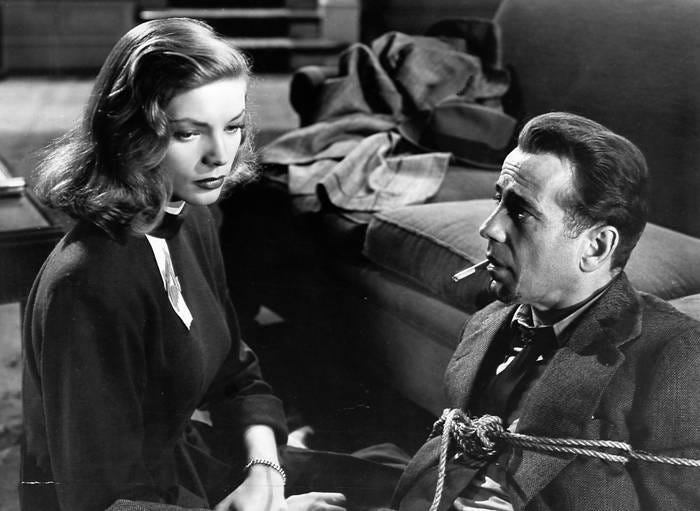
Sticking with thrillers, in what universe is it reasonable to overlook film noir classic The Big Sleep (1946)? Howard Hawks’s adaptation of Raymond Chandler’s notoriously convoluted hard-boiled gem features sexually charged chemistry between Humphrey Bogart and Lauren Bacall, and emphasises mood above all else, even plot coherence. Apparently, Hawks was so confused at one point that he called Chandler to ask who murdered the chauffeur, and even he didn’t know. But it doesn’t matter. This is a classic with good reason. Not a single nomination? Come now. It at least deserved nods for Hawks, Bogart, and Bacall for Best Director, Best Actor, and Best Actress.
If you think I’m still bitter about The Big Sleep, that’s nothing compared to my fury that the Academy completely ignored Henri-Georges Clouzot’s Les Diaboliques (1955). This magnificent psychological thriller (or horror film, as some consider it) features one of the most fiendishly brilliant plot twists in cinema history; so good, in fact, that the end credits urge viewers not to reveal it. Clouzot should have got a Best Director nomination, at the bare minimum.
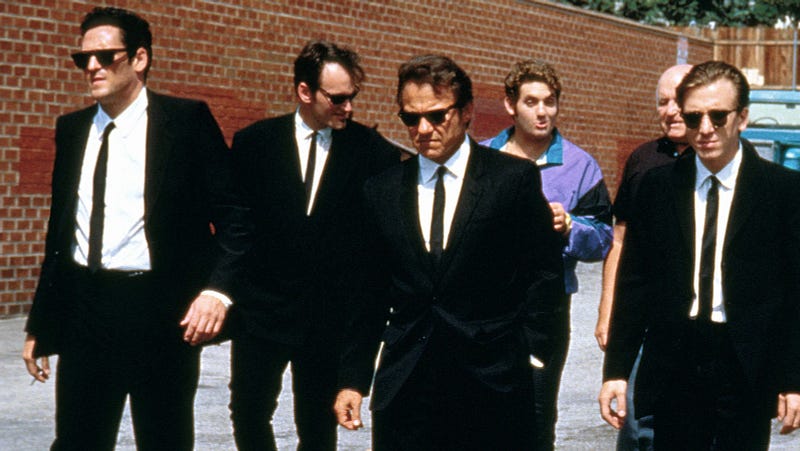
Leaping ahead a little further, here are a couple of crime classics that were similarly given the silent treatment. Reservoir Dogs (1992) contains neither reservoirs nor dogs, but involves a gang of vicious loonies who argue about Madonna and tipping before bungling a heist and winding up in a warehouse. Here they point fingers at one another, paranoid that they have a rat in the house. Quentin Tarantino’s arresting and spectacularly violent debut remains his best film as far as I’m concerned. Pulp Fiction (1994) went on to greater acclaim, including an Oscar win for Best Original Screenplay. He at least ought to have been nominated in that category here too.
Here’s another heist movie shown no love by Oscar: Heat (1995). Michael Mann’s masterpiece features Robert De Niro and Al Pacino as master criminal and hard-boiled cop, respectively, each determined to take the other down. A near three-hour crime epic ensues, with fine supporting performances from the likes of Val Kilmer, Ashley Judd, Natalie Portman, Tom Sizemore, and Amy Brenneman. The heist centrepiece, which overspills into a pitched gun battle between De Niro’s crew and police, is an absolute standout. Why no Oscar nominations? I’d argue this at least deserved Best Picture and Best Director nods. I’d also have added a Best Actor nomination for Robert De Niro, as I much prefer his subtle, nuanced performances, where you can tell what his character is thinking and feeling with the tiniest of expressions.
On the more fact-based side of things, how about Zodiac (2007)? David Fincher’s crime drama based on the police hunt for the Zodiac serial killer is brilliant on multiple levels, and to my mind deserved a nod for Best Picture and Best Director. There are other thrillers I could mention, but in the interest of brevity, I’ll move on.
The Genre Oscar Loves to Hate Part 1: Comedy
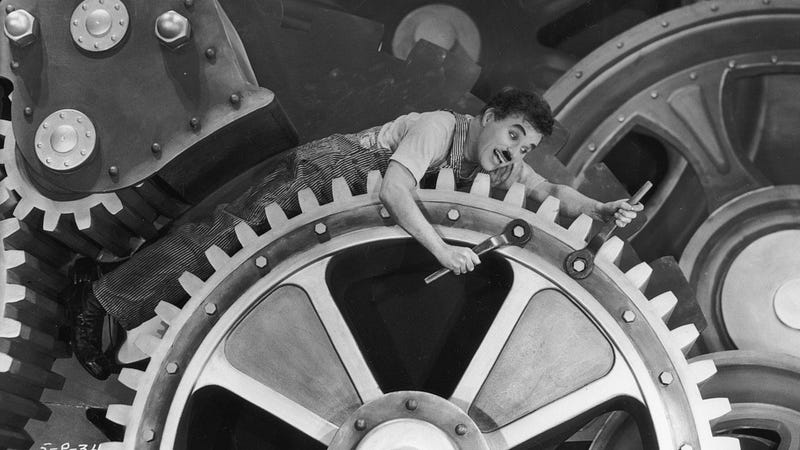
A dismaying number of classic comedies have been disregarded by the Oscars over the decades. The sublime silliness of the Marx Brothers was ignored even at its absolute pinnacle, in Duck Soup (1933). Charlie Chaplin’s classic Modern Times (1936) was similarly given the cold shoulder.
Yes, all right, technically there are less uneven Chaplin films, and The Gold Rush (1925) probably remains his funniest, but Modern Times is my personal favourite. Many set pieces are laugh-out-loud hilarious, especially the feeding machine sequence. The slapstick and satire, sending up the dehumanising effect of industrial progress, is good-natured rather than scathing, and it remains relevant today. This melds well with the romantic aspect, provided by Paulette Godard’s love interest. In my not remotely humble opinion, Best Picture and Best Director nominations ought to have been forthcoming.
Classic screwball romantic comedies have also been routinely ignored. Bringing Up Baby (1938) and His Girl Friday (1940), for instance. Both are splendid pieces of work; fast, funny, and featuring first-rate performances from Cary Grant (in both), as well as from his co-stars, Katharine Hepburn and Rosalind Russell. Best Actor and Best Actress Oscar nominations ought to have been forthcoming for all concerned, as well as Best Director nods for Howard Hawks.
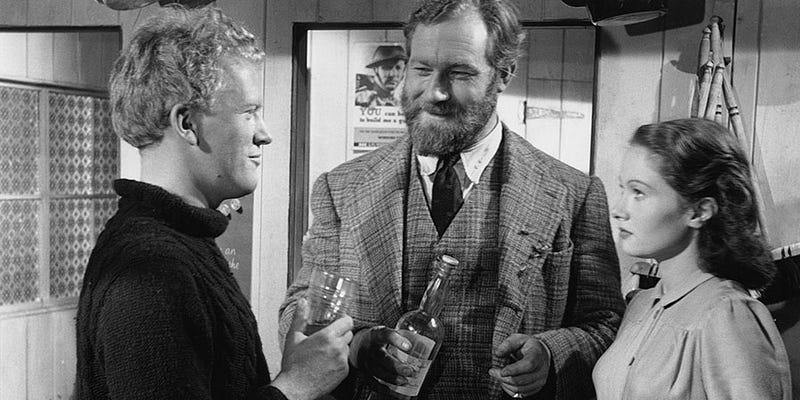
Other classic comedies ignored by the Academy include a brace of British Ealing Studio classics, Whisky Galore! (1948) and Kind Hearts and Coronets (1949). The former is a whimsical gem set during World War II, concerning a whisky-starved small island community off the west coast of Scotland. When a cargo ship full of whisky runs aground in their waters, the islanders half-inch the booze (though not on a Sunday, as they’re strict Scottish Presbyterians), then play a game of cat and mouse with overzealous inland revenue officials. For reasons too farcical to explain, a couple of love stories get tangled up in all this, and much hilarity ensues.
To be shown in America, writers Compton McKenzie and Angus MacPhail, along with director Alexander Mackendrick knew this subversive gem wouldn’t pass the censors who insist such immorality be punished. To that end, they included an absurd final joke at their expense of said censors, delivered in a deliciously deadpan voiceover, announcing afterwards that “if that isn’t a moral story, I don’t know what is.” Perhaps knowing they were being ridiculed, American censors insisted the film be retitled Tight Little Island for US release, presumably to prevent consternation in midwestern dry counties amid the Bible belt. At any rate, this as much as anything else perhaps contributed to the film being shut out at the Oscars.
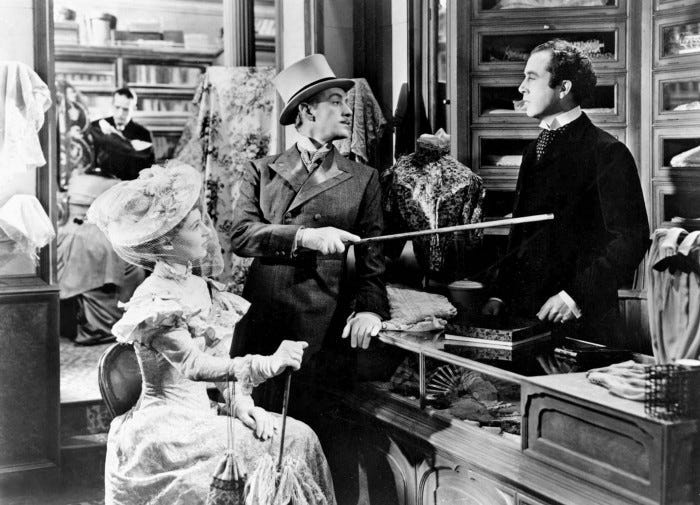
As for Kind Hearts and Coronets, there is no such excuse for excluding what is, to my mind, the greatest black comedy of all time, tied with Dr. Strangelove (1964). Most Ealing comedies are eccentric and whimsical, but Robert Hamer’s film is dark and vicious, featuring an outcast aristocrat (Dennis Price) attempting to murder his way through various relatives (all played by Alec Guinness, including the women) to inherit a Dukedom. This savage satire on the cruelty of the class system ought to have at the very least gleaned nominations for Best Adapted Screenplay (Hamer and co-writer John Dighton rightly stripped out the anti-semitism from the source material by Roy Horniman), Best Actor (for Price), and Best Supporting Actor (for Guinness). I’d have added Best Director and Best Picture to that tally as well.
Before moving on from comedy, I must add that Woody Allen’s Sleeper (1973), to my mind one of his funniest works, was also entirely overlooked at the Oscars. Frankly, I still think it’s one of his best. Also, not comedies per se, but legendary British filmmakers Michael Powell and Emeric Pressburger were also given the Academy brush-off for two of their finest works: romantic fantasies I Know Where I’m Going (1945) and A Matter of Life and Death (1946). Two of the greatest films of all time, intolerably disregarded.
The Genre Oscar Loves to Hate Part 2: Horror
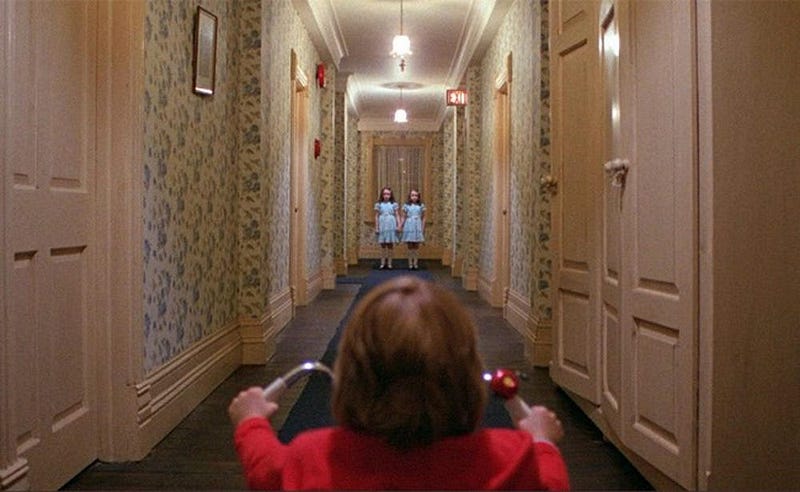
I could write a separate article on the many horror films shamelessly given the Oscar cold shoulder, starting with James Whale’s iconic, influential Frankenstein (1931) starring Boris Karloff. However, I’m concerned decades will pass whilst you read if I go down that route. For the purposes of this article, I’ll stick to two well-known examples. First up: Stanley Kubrick’s The Shining (1980). Paraphrasing one of my favourite Oscar Wilde quotes, to entirely overlook a Kubrick film for Oscar nominations once (1957 anti-war masterpiece Paths of Glory) may be regarded as a misfortune. To do it twice looks like carelessness. This double whammy of nomination no-shows still provokes jaw-dropping incredulity from yours truly.
Hated by Stephen King, loved by cineastes, Kubrick’s adaptation of King’s novel stripped out much of the supernatural elements, making it more psychological horror than ghost story. Wannabe writer Jack Nicholson goes nuts in the isolated Overlook Hotel in gloriously demented fashion, after he takes a winter caretaker job. Featuring iconic imagery and performances, this characteristically meticulous Kubrick classic remains, as my younger brother once put it, “pants-wettingly scary”. Obviously, this should have had Best Picture and Best Director nominations, as well as acting nominations, especially for Shelley Duvall. Her convincingly terrorised performance may have been the result of being terrorised by Kubrick, but it still deserves major credit.
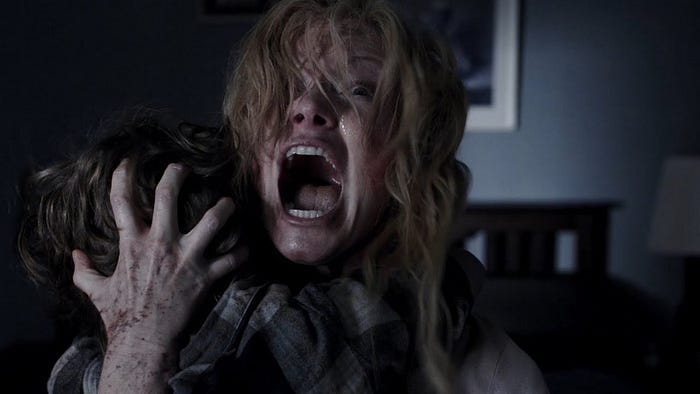
Secondly and more recently, what of The Babadook (2014)? Jennifer Kent’s sublimely scary psychological horror isn’t merely a spine-freezing masterpiece of nightmare-inducing terror. This tale of a mother and son grappling with monstrous manifestations of guilt and grief is also profoundly compassionate, cathartic, and humane in its metaphorical exploration of what happens when sadness and resentment are repressed. The story is all the more potent for tackling the taboo idea that a mother might be driven by demonic rage to kill her son in such circumstances.
Oscar nominations should have gone to Kent for Best Director and Best Original Screenplay, Essie Davis for Best Actress, and Radek Ładczuk for Best Cinematography. Frankly, it also should have won the lot, and Best Picture, to boot (and that’s in a competitive year that also included Nightcrawler, Boyhood, Birdman, The Grand Budapest Hotel, and Interstellar). Shame on everyone concerned.
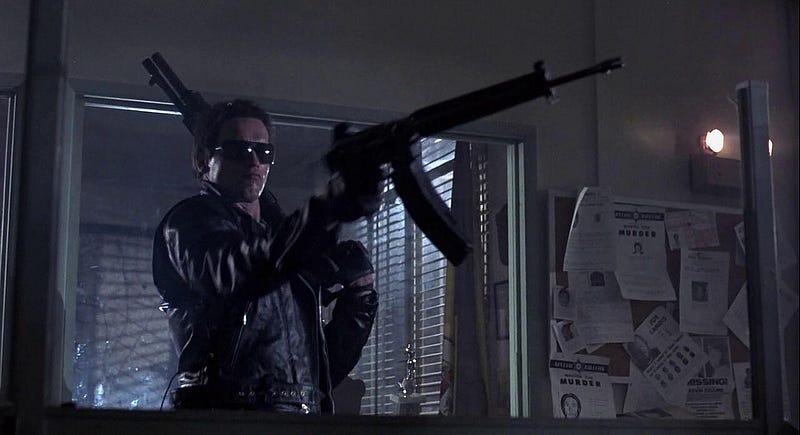
Although more sci-fi action than horror, James Cameron’s The Terminator (1984) has enough horror elements to segue into here. Again, astonishingly, it is another classic entirely without nominations. This features Arnold Schwarzenegger’s career-defining role, as a cyborg sent back from the future to assassinate young waitress Sarah Connor (Linda Hamilton), destined to give birth to the saviour of mankind after an AI apocalypse. It’s also the film that announced Cameron as a major talent and action director par excellence and, for my money, remains his best film.
Speaking of money, it is also his least expensive. The Cameron rule of thumb is the bigger his budgets get, the less interesting his films become, with the arguable exception of Terminator 2: Judgment Day (1991). At any rate, years before Titanic (1997), The Terminator ought to have brought Cameron some Oscar glory. I don’t begrudge Amadeus (1984) the Best Picture win, but it should have been nominated in that category. Also, I’d have awarded The Terminator Best Original Screenplay, even if Cameron and co-writer Gale Anne Hurd did partly rip off a Harlan Ellison episode of The Outer Limits.
The Genre Oscar Loves to Hate Part 3: Westerns
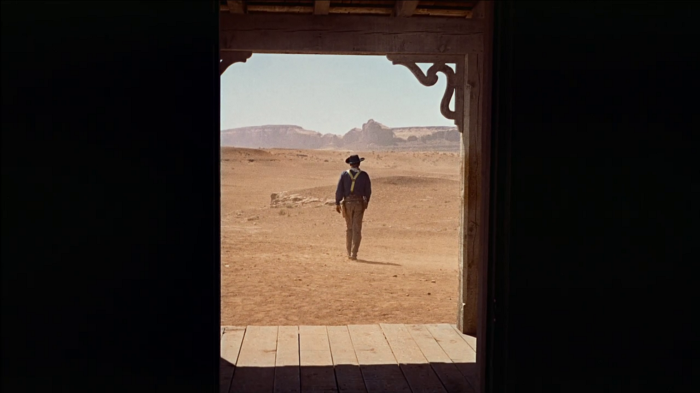
The list of great westerns embarrassingly ignored by the Academy includes John Ford classics My Darling Clementine (1946) and The Searchers (1956). Frankly, the latter oversight warrants the creation of an International Crimes Against Cinema Tribunal, perhaps in The Hague, where those responsible can answer for their actions. John Ford’s masterpiece deserved Oscars for Best Picture, Best Direction, and Best Cinematography (thanks to Winton C Hoch, Monument Valley never looked more menacing). Furthermore, this really ought to have been the film for which John Wayne won a Best Actor Oscar, rather than True Grit (1969).
Then there’s the infuriating case of The Good, the Bad, and the Ugly (1966). Sergio Leone’s spaghetti western masterpiece deserves a special shout because Leone is particularly overlooked by Oscar in no-nominations ignominy (at least John Ford won Oscars for other films). To again paraphrase Oscar Wilde, overlooking Leone once may be regarded as a misfortune. Overlooking him again for Once Upon a Time in the West (1968) looks like carelessness. To overlook him a third time, for Once Upon a Time in America (1984), challenges one’s belief in the existence of a benevolent God. No nominations for any of them? Again, a case for the International Crimes Against Cinema Tribunal.
The Good, the Bad, and the Ugly — a tale of three gunslingers and their search for buried gold, with the American Civil War as a backdrop — remains one of the quintessentially great westerns. It’s shot with singular epic vision by Leone, replete with his trademark squinting closeups, shootouts, and splendid narrative turns, not to mention Ennio Morricone’s astonishingly brilliant music score. That this film was overlooked in every category is an absolute travesty. Clint Eastwood has never been cooler, Lee Van Cleef has never been more menacing, and Eli Wallach is a brilliant foil for both.
No nominations? Seriously?
Non-English Language Films
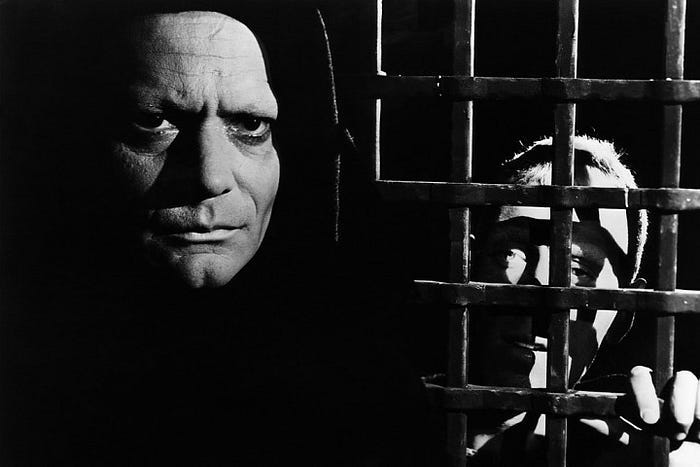
It’s worth adding that many great non-English language films have been overlooked by Oscar over the last century, from the aforementioned Les Diaboliques to Ingmar Bergman’s classic medieval fantasy Det Sjunde Inseglet (The Seventh Seal) (1957) and Mathieu Kassovitz’s tough, gritty, uncompromising masterpiece La Haine (Hate) (1995). At the very least, all three should have been nominated (and won) in the Best Film Not in the English Language categories, and also both should have had Best Picture and Best Director nominations.
Here’s one more criminally overlooked non-English language masterpiece; a personal favourite: In the Mood for Love (2000). This exquisitely agonising romantic drama from Wong Kar-Wai is the director’s greatest achievement. Set in 1960s Hong Kong, it involves neighbours Tony Leung and Maggie Cheung discovering their spouses are having an affair and finding mutual comfort. They decide to roleplay their spouses in an attempt to ascertain how the affair began, but of course, they fall for one another in the process. This could have been nominated in all sorts of categories. The direction is masterful, the screenplay subtle, the acting nuanced, and the cinematography gorgeous (Christopher Doyle and Mark Lee Ping Bin). The cumulative effect an understated slow-burn of heartbreak and longing. Great use of music too (courtesy of Shigeru Umebayashi).

Two more quick honourable mentions for films not mentioned elsewhere: Martin Scorsese’s breakthrough gangster classic Mean Streets (1973), and Richard Linklater’s romantic gem Before Sunrise (1995). Both should at least have had acting nominations for Harvey Keitel and Robert De Niro (in the former) and Julie Delpy and Ethan Hawke (in the latter). I’ve also failed to mention overlooked documentaries, so here’s a brief shout for Point of Order (1964), Salesman (1968), High School (1968), F for Fake (1973), Shoah (1985), The Thin Blue Line (1988), Hearts of Darkness (1991), Hoop Dreams (1994), Grizzly Man (2005), and Senna (2010).
Do you share my dismay for all this lack of recognition? What have I missed? What classic film got zero nominations that I’ve failed to mention? Let me know in the comments. For extra cineaste points, tell me in what categories it ought to have had nominations. Or if that sounds like too much hard work, just leave lots of nice remarks consoling me about these oversights. It still hurts, and all thoughts and prayers are welcome.
The Dillon Empire beyond Medium
For a full list of my published novels, click click here.
For more on my novels and other projects, click here for my blog.
For my Patreon page, click here.